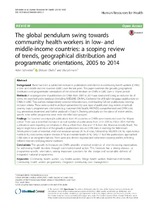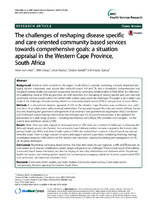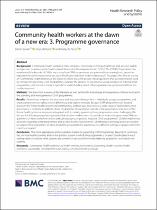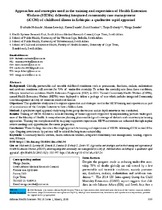The global pendulum swing towards community health workers in low- and middle-income countries: A scoping review of trends, geographical distribution and programmatic orientations, 2005 to 2014
Abstract
BACKGROUND: There has been a substantial increase in publications and interest in community health workers (CHWs) in low- and middle-income countries (LMIC) over the last years. This paper examines the growth, geographical distribution and programmatic orientations of the indexed literature on CHWs in LMIC over a 10-year period. METHODS: A scoping review of publications on CHWs from 2005 to 2014 was conducted. Using an inclusive list of terms, we searched seven databases (including MEDLINE, CINAHL, Cochrane) for all English-language publications on CHWs in LMIC. Two authors independently screened titles/abstracts, downloading full-text publications meeting inclusion criteria. These were coded in an Excel spreadsheet by year, type of publication (e.g. review, empirical), country, region, programmatic orientation (e.g. maternal-child health, HIV/AIDS, comprehensive) and CHW roles (e.g. prevention, treatment) and further analysed in Stata14. Drawing principally on the subset of review articles, specific roles within programme areas were identified and grouped. FINDINGS: Six hundred seventy-eight publications from 46 countries on CHWs were inventoried over the 10-year period. There was a sevenfold increase in annual number of publications from 23 in 2005 to 156 in 2014. Half the publications were reporting on initiatives in Africa, a third from Asia and 11 % from the Americas (mostly Brazil). The largest single focus and driver of the growth in publications was on CHW roles in meeting the Millennium Development Goals of maternal, child and neonatal survival (35 % of total), followed by HIV/AIDS (16 %), reproductive health (6 %), non-communicable diseases (4 %) and mental health (4 %). Only 17 % of the publications approached CHW roles in an integrated fashion. There were also distinct regional (and sometimes country) profiles, reflecting different histories and programme traditions. CONCLUSIONS: The growth in literature on CHWs provides empirical evidence of ever-increasing expectations for addressing health burdens through community-based action. This literature has a strong disease- or programme-specific orientation, raising important questions for the design and sustainable delivery of integrated national programmes.
Collections
Related items
Showing items related by title, author, creator and subject.
-
The challenges of reshaping disease specific and care oriented community based services towards comprehensive goals: a situation appraisal in the Western Cape Province, South Africa
Schneider, Helen; Schaay, Nikki; Dudley, Lilian; Goliath, Charlyn; Qukula, Tobeka (BioMed Central, 2015)Similar to other countries in the region, South Africa is currently reorienting a loosely structured and highly diverse community care system that evolved around HIV and TB, into a formalized, comprehensive and integrated ... -
Community health workers at the dawn of a new era: 3. Programme governance
Lewin, S; Lehmann, U; Perry, H (BMC, 2021)Background: Community health workers (CHWs) can play a critical role in primary healthcare and are seen widely as important to achieving the health-related Sustainable Development Goals (SDGs). The COVID-19 pandemic ... -
Approaches and strategies used in the training and supervision of Health Extension Workers (HEWs) delivering integrated community case management (iCCM) of childhood illness in Ethiopia: a qualitative rapid appraisal
Nsibande, Duduzile; Loveday, Marian; Daniels, Karen; Sanders, David; Doherty, Tanya; Zembe, Wanga (Makerere University Medical School (Uganda), 2018)BACKGROUND: Globally, preventable and treatable childhood conditions such as pneumonia, diarrhoea, malaria, malnutrition and newborn conditions still account for 75% of under-five mortality. To reduce the mortality rate ...




